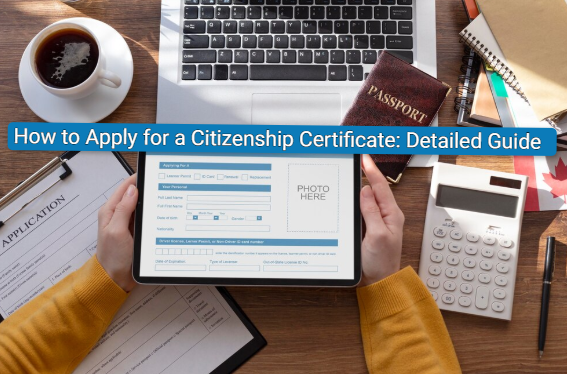How to Apply for a Citizenship Certificate
Let’s be honest—immigration forms are frustrating. You might already be a U.S. citizen through your parents, but if you don’t have proof, you’re stuck. That’s where the “Certificate of Citizenship” comes in.
If you’re wondering how to apply, what it costs, or even why it matters, this guide is for you. I’ll break it all down in a simple way—no legal jargon, no guessing games.
I’ve worked with people going through this process, and trust me, you’re not alone if you’ve been staring at “Form N-600” wondering where to even begin.
Let’s walk through it together.
What Is the Certificate of Citizenship—and Do You Need One?
If you were born outside the U.S. but one or both of your parents are U.S. citizens, you might already be a citizen—you just don’t have the paperwork to prove it.
That’s where the USCIS Certificate of Citizenship comes in. It’s a document issued by the U.S. government that proves you’re a citizen. Not because you went through naturalization, but because you inherited citizenship.
You didn’t choose it—it’s yours by law.
This certificate becomes your proof for getting a passport, applying for benefits, proving your legal status, and avoiding a ton of headaches later.
Who Can Apply?

This is key because Form N-600 is not for everyone.
You can apply for a Certificate of Citizenship if:
- You were born outside the U.S.
- You have at least one U.S. citizen parent.
- You meet the requirements under immigration law for acquiring or deriving citizenship.
You might also qualify if:
- You were adopted by a U.S. citizen.
- Your parent naturalized before your 18th birthday, and you were a permanent resident living in their legal custody.
This is a common scenario: your parent naturalized when you were a child, and no one filed paperwork for you. Now you’re older and realize—wait, I never got proof of my citizenship.
If that’s you, this application is how you fix it.
Difference Between Certificate of Citizenship and Naturalization?
Good question. A lot of people confuse these two.
Naturalization is when someone becomes a U.S. citizen after going through a process—like taking the civics test, attending an interview, etc. That ends with a Certificate of Naturalization.
But if you already became a citizen through your parents—automatically—you don’t need to naturalize. You just need the Certificate of Citizenship to prove it.
That’s why you’re filing Form N-600, not N-400.
What Is Form N-600?

Form N-600 is the official application for a Certificate of Citizenship. It’s used to request your certificate from USCIS.
Yes, it’s long. Yes, it’s difficult. But once it’s done, you’ll have lifelong proof of your citizenship. That’s worth the effort.
Some people call it the N-600 Certificate of Citizenship or even just the Citizenship Certificate Form. Same thing. This is the form you need if you’re claiming U.S. citizenship through your parents.
What You’ll Need to Apply
Here’s where most people get stuck—what do you need to send in?
It depends on your specific case, but you’ll generally need:
- Your birth certificate
- Proof that your parent is or was a U.S. citizen (like their birth certificate or naturalization certificate)
- Proof of your relationship to your parent (birth or adoption records)
- Evidence of legal and physical custody, if required
- Proof of your lawful admission to the U.S. (like a green card)
If your documents aren’t in English, you need to include certified translations.
Tip: Don’t send originals unless USCIS asks for them. Copies are usually fine, and they’ll request originals later if needed.
How to Fill Out the Application
Filling out the Form N-600 application for a Certificate of Citizenship takes time, but it’s doable.
You can file it:
- Online, by creating a USCIS account, or
- By mail, using the correct address based on where you live (check the USCIS website)
Make sure every section is filled out. Don’t leave gaps unless they truly don’t apply to you.
And don’t guess on dates or names. If something doesn’t match your supporting documents, it could cause delays.
How Much Does It Cost?

The fee for a citizenship certificate is currently $1,385 (subject to change).
That’s the cost of a certificate of citizenship, whether you file online or by mail. You can pay with a credit card, check, or money order.
If that’s too expensive, you might qualify for a fee waiver. To request one, you’ll need to fill out Form I-912 and submit supporting evidence that you receive public benefits or meet the income requirements.
It’s a high fee, but it’s a one-time cost, and the certificate doesn’t expire.
How Long Does It Take?
The N-600 processing time usually runs between 8 to 14 months, depending on where your case is being handled and whether USCIS asks for more info.
They might send a Request for Evidence if anything’s unclear, or they might schedule an interview. Interviews are rare, but not impossible.
You’ll get a receipt notice after you apply, and you can track your case online using the receipt number.
After You’re Approved
Once your application is approved, USCIS will mail you the Certificate of U.S. Citizenship. This is a legal document—keep it safe. It can be used to:
- Apply for a passport
- Show proof of status for jobs or school
- Access government benefits
- Avoid problems with immigration enforcement
If you ever lose it, you’ll have to file Form N-565 and pay a replacement fee. So, make sure you store it somewhere secure.
Final Thoughts: Why This Matters

A lot of people delay this process because it seems confusing. Or they assume that having a green card or passport is enough.
But the Certificate of Citizenship is your legal, permanent proof of your U.S. status. It matters for jobs. It matters for travel. And it matters when immigration laws change.
If you’re eligible and don’t have it yet, now is the time to apply.
Want Help Filing It Right the First Time?
At Passage Immigration Law, we help people just like you figure out how to apply for a certificate of citizenship—and get it right the first time.
Book a consultation to get started—and protect your future with the citizenship proof you deserve.
DISCLAIMER: This article offers general legal information, not legal advice. Do not rely upon this information without seeking legal counsel. If you need legal advice, you may contact us directly to speak with an attorney. We disclaim all liability with respect to actions taken based on any information presented. Every case is different, and outcomes will vary depending on the unique facts and legal issues of your case.







